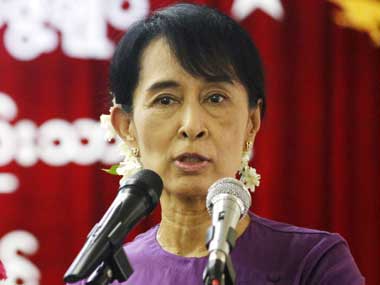As a student of politics at Lady Shri Ram College in New Delhi in the early 1960s, and the daughter of Burma’s ambassador to India, Aung San Suu Kyi had a front row seat to the world’s biggest democratic experiment. And although the post-Independence euphoria in India was already giving way to intense political bickering - and bruising wars with Pakistan and, later, China, India’s stature as the only working democracy in the subcontinent inspired her enough, years later, to launch a pro-democracy movement in her homeland. [caption id=“attachment_17652” align=“alignleft” width=“380” caption=“Myanmar’s pro-democracy leader Aung San Suu Kyi is unhappy with India. Soe Zeya Tun/Reuters”]  [/caption] But released last year after nearly two decades in detention by Myanmar’s military rulers, Suu Kyi sees India as much less of an inspiration. Indeed, she confesses to a certain “sadness” that India appears to have lost its moorings – and its strength as a voice for moral good on the world stage. Where once it was a lead player and an inspiration in the anti-colonial movement, it was now openly embracing Myanmar’s military junta, which had robbed her of her election victory in 1990 and had jailed her. Participating from Yangon in a live video question-and-answer sessions with students at the Hong Kong University on Monday, Suu Kyi said she feels “sad” that “India is not as concerned about our fate as we would like them to be.” Slippery slope of illiberalism This isn’t the first time, of course, that India’s accommodation of Myanmar’s military rulers has come in for criticism. During his India visit last year, President Barack Obama, addressing a joint session of Parliament, called India to account as having not done enough to speak out against Myanmar’s military rulers. Liberal voices in India too have pilloried the government for a long while now on that slide down the slippery slope of illiberalism. Last year, Nobel Laureate Amartya Sen wrote: “As a loyal Indian citizen, it breaks my heart to see the prime minister of my democratic country… welcoming the butchers from Myanmar and to be photographed in a state of cordial proximity.” What’s pushed India down that slope, of course, is a cold-blooded calculation of perceived “national interests”, particularly in competition with China’s much more resourceful (and much less finicky) diplomacy in Myanmar. The security calculus The clearest (and most cynical) explanation of India’s interest in Myanmar was outlined in WikiLeaks cables from 2007. Mohan Kumar, an official in India’s Ministry of External Affairs, tells US diplomats, who were pushing India to scale back its engagement with the junta: the GOI’s current policy of engagement with Burma was absolutely necessary as “The ULFA guys hiding in Burma are screwing the hell out of us!” “Burma is the only one helping us.” Pointing to alleged Bangladesh unwillingness to confront Indian insurgent groups camped on its borders, Kumar argued, “Tell Bangladesh to cooperate and I am happy to say bye-bye Myanmar.” Kumar (further) stated that “Bangladesh’s stubbornness in allowing access to transit routes for trade leaves us with Burma as the only alternative to connect the northeast to ASEAN markets,”" and provide an economic incentive for ULFA to lay down its arms. “Do you want us to connect through China?,” he asked. Kumar commented that ASEAN and China maintained close ties with Burma but did not face the same pressure from the U.S. to refrain from engaging. But, in Sen’s estimation, such cynical realpolitik considerations are manifestations of a “defeatism” about Burma. “The problem," he writes, “arises rather from a change of the political climate in India in which narrowly defined national interest - or what is taken to be national interest - gets much loyalty, and in which India’s past propensity to lecture the world on global political morality is seen as a sad memory of Nehruvian naivety.” But history doesn’t always flow in straight lines. Even during the period when India was “lecturing the world”, its closest ally was a non-democratic superpower that sent dissenters to gulags. It’s also a fair bet that were Suu Kyi to become a democratically elected leader of Myanmar today, she too would likely be sucked into the downward spiral of cynical geopolitics of the kind that she derides India for today. Perhaps only dispossessed leaders of democratic movements and Nobel Prize-winning economic philosophers can enjoy the luxury of the voice of morality in today’s world.
She reckons that India has lost its voice of morality, but is that a luxury for anyone in power in today’s cynical world of geopolitics?
Advertisement
End of Article
Written by Vembu
Venky Vembu attained his first Fifteen Minutes of Fame in 1984, on the threshold of his career, when paparazzi pictures of him with Maneka Gandhi were splashed in the world media under the mischievous tag ‘International Affairs’. But that’s a story he’s saving up for his memoirs… Over 25 years, Venky worked in The Indian Express, Frontline newsmagazine, Outlook Money and DNA, before joining FirstPost ahead of its launch. Additionally, he has been published, at various times, in, among other publications, The Times of India, Hindustan Times, Outlook, and Outlook Traveller. see more


)
)
)
)
)
)
)
)
)



